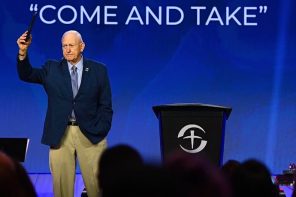Last month, the New York Times speculated that white evangelical women may make up a surprise network of progressive voters this midterm election, featuring white evangelical women in Texas who are supporting Beto O’Rourke, the Democrat challenging diehard Christian conservative Senator Ted Cruz. One woman interviewed described how donning a bumper sticker for a Democrat felt like “an act of rebellion.”
As sociologists studying the messages presented at one of the largest and most trendy Christian women’s conference in the United States, the annual IF: Gathering, we know that evangelical women can often sound more like supporters of O’Rourke than Cruz (the Atlantic’s profile of evangelical superstar Beth Moore is another example). In fact, if we had to place this group of mostly white evangelical women on a political spectrum based solely on the messages they present at the conference, we would dub them liberals. But because these women remain firmly committed to an evangelical culture that is closely tied to conservative politics, their messages lose their progressive potential. In short, the IF: Gathering shows white evangelical women may appear close to supporting progressive political candidates, but not as close as some are tempted to conclude.
Provocatively but vaguely titled, IF was founded by Jennie Allen, a white evangelical author, speaker and self-described “lover of God and passionate justice fighter.” Alongside a star-studded team of fellow evangelicals such as Jen Hatmaker, Ann Voskamp, and Kay Warren, Allen launched IF: Gathering in 2014, a large and hugely successful two-day conference hosted in Austin or Dallas, Texas, and live-streamed to thousands of small gatherings across the country.
On stage, IF speakers do not talk explicitly about abortion, gun laws, regulating the bathrooms of transgender people, or immigration. Instead, they talk about how women’s relationships and compassion for the downtrodden can help solve social problems like poverty, homelessness, sex trafficking, and racism. Yet even as IF speakers spend more time talking about traditionally liberal topics, IF: Gathering sabotages any effort to change the consistent patterns of white evangelical women’s political allegiances to Republicans. This is because all conference discussions have something in common: they sweep America’s political divides under the rug.
Last year, the annual IF: Gathering took place less than a month after President Trump’s inauguration. Like previous years, this conference included a “racial reconciliation” session where a racially diverse group of women sit around a table to talk about overcoming racism and the importance of interracial friendships between Christian women. Only this time, the black women in the session addressed what the group calls “the elephant in the room” by pressing white women to contemplate why interracial friendships are emotionally taxing for women of color.
Amena Brown, a Black spoken-word poet, weighed in on the issue, saying she’s tired of always having to forgive white people for their racist behavior. Despite these expressions of frustration, no one in the session brought up arguably the biggest elephant in the room—the President or the white supremacist movements that support him. This is in line with what sociologists have long observed about white evangelicals’ reactions to race and racism that emphasize interpersonal solutions rather than the structural source of racial problems.
Unlike racial reconciliation sessions that are progressive (if reductive) in tone, some of the other conference sessions are decidedly conservative. In one, Rebekah Lyons, a white author and speaker, shouted to an auditorium full of over 2,000 Christian women that God will create a word in which there is “No Addiction! Depression! Anxiety! Lust! Pornography! Suicidal thoughts! Gender confusion! Same-sex attraction! Church division!” As she clasps her hands in prayer and bows her head, many members of the audience raise their hands in praise. Though this prayer could have appeared in an American Family Association promotional, it’s an outlier at the conference. Only a few out of nearly 100 conference sessions over the years that we analyzed make reference to the issues we typically associate with the religious right, such as conservative gender and sexual politics.
Instead, IF: Gathering focuses on using personal relationships to transcend social division and difference. In the words of IF founder Jennie Allen, these relationships “can change the world.” In 2017, she got on stage and asked a rhetorical question, “How many people feel like the world is complicated right now?” She nodded her head and explained, “we have a very important mission in the midst of this complicated world. I believe that women with other women on living room floors with their Bible open can change the world.” Each year, Allen returns to the theme that Christian women must focus on what she calls “small acts” of discipleship, spreading the gospel and living according to God’s word.
“Small acts” involve kindness and compassion, sharing meals, and spending time with people Jennie describes as “in the trenches”; those who have few resources and little privilege. One illustration of small acts is Renee, a white woman featured at the 2017 IF: Gathering. Renee calls her work in Huntington, West Virginia, an “urban ministry” that involves hosting a weekly meal where she gathers women “from the community” (who, we see from video clips, are Black women). Renee says the experience has “flipped [her] walk with Jesus around,” and concludes that at her table, “Nobody is viewed as a project. Nobody is viewed as less than anybody else. Nobody is viewed as better than anybody else …. We’re all the same—and we’re all equal when we’re around the table.”
IF speakers focus on the gospel’s message of love and compassion and on cultivating relationships that transcend difference. This message, delivered by a group of women for women, could connect to progressive politics and, in turn, lead women to support Democratic candidates. Instead, IF speakers compartmentalize their passion for social justice from the consequences of their vote, which allows the evangelical status quo to remain in place where conservatism is an unspoken default. It’s no wonder then that white evangelical women think voting for a Democrat like O’Rourke is an act of rebellion. It would be.




